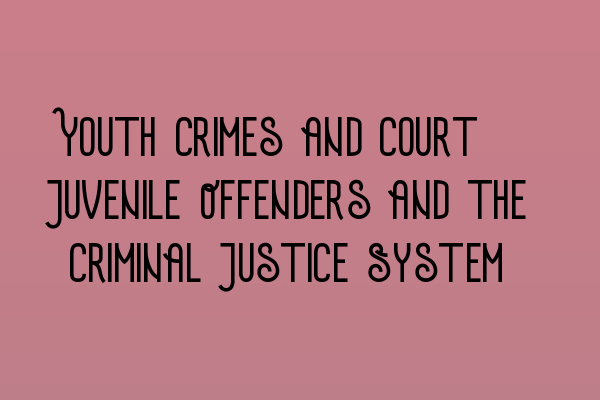Youth Crimes and Court: Juvenile Offenders and the Criminal Justice System
When it comes to youth crimes and the judicial system, understanding the unique dynamics and processes involved is crucial. In this article, we will explore the topic of juvenile offenders and their interaction with the criminal justice system in the UK.
It is important to note that juvenile offenders, also known as young offenders, are individuals below the age of 18 who have committed criminal offenses. The legal framework surrounding juvenile offenders is distinct from that of adult offenders, as it takes into account the age and developmental stage of the young individual.
The Role of the Criminal Justice System
The criminal justice system plays a significant role in dealing with youth crimes. Its primary objective is not only to punish but also to rehabilitate and reintegrate young offenders back into society. The focus is on preventing recidivism and promoting positive behavior change.
When a youth offender is brought to the attention of the authorities, a series of steps are followed to ensure fair and appropriate treatment. These steps include:
- Arrest and Detention: When a young offender is apprehended, they are usually taken into custody by the police. The police have certain powers when dealing with a young person, including the power to release them on bail or to detain them for further investigation.
- Custodial Sentencing: In some cases, if a young offender is found guilty of a serious offense, they may be sentenced to a period of detention in a youth offender institution. However, custodial sentences are generally used as a last resort, with the emphasis being on community-based alternatives.
- Community-based Alternatives: The criminal justice system strives to provide young offenders with opportunities for rehabilitation in the community. These alternatives may include probation, community service, counseling, education, or restorative justice programs.
- Reintegration: The ultimate goal of the criminal justice system is to reintegrate young offenders back into society as law-abiding citizens. This involves providing them with support, education, and employment opportunities to prevent them from reoffending.
The Importance of Legal Representation for Juvenile Offenders
Legal representation is a fundamental right for anyone involved in the criminal justice system, regardless of age. For young offenders, having a solicitor who specializes in youth crime is essential. A skilled solicitor can ensure that the rights of the young person are protected throughout the legal proceedings.
From the moment a young person is arrested, their solicitor can provide them with legal advice and guidance. This includes explaining their rights, exploring potential defense strategies, and negotiating with the prosecution to secure the best possible outcome.
Moreover, a solicitor can also assist in obtaining community-based alternatives to custody, highlighting the potential for rehabilitation and addressing the underlying causes of the youth offender’s behavior. This proactive approach can make a significant difference in the trajectory of a young person’s life.
Conclusion
Dealing with youth crimes and navigating the criminal justice system can be complex, but it is imperative that the rights and well-being of young offenders are protected and prioritized. By understanding the unique dynamics of juvenile offenders and their interaction with the legal system, we can work towards fostering rehabilitation, reintegration, and positive change.
If you want to learn more about legal topics and practices, feel free to check out our related articles:
- LLC Formation Made Simple: Step-by-Step Guide for UK Entrepreneurs
- Business Regulations in the UK: A Comprehensive Overview
- Preparing for the SQE Exam: Strategies and Resources for Success
- SQE Workshops and Webinars: Accelerate Your Exam Preparation
- Delaware Corporate Law for UK Solicitors: Key Insights and Practices
